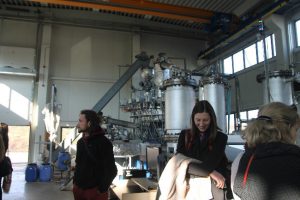
On April 16, 2018, Admas hosted the second excursion of Lifelong Learning course participants focused on the so-called circular economy. Course organizers, Faculty of Environmental Protection of ICT Prague, and its partners, Institute of Circular Economics, r.i., SUEZ Resource use and the Czech Association of Circulation, has chosen the AdMaS Center with regard to its current activities in the concerned area but also beacuse of the technical and technological background of the Center.
The organizers and participants primarily expressed their interest in the area of waste management, which is focus mainly of the research groups EGAR, Building Technologies and Microstructure of Building Materials. There was a demonstration of technologies for energy recovery from wastewater, biohazard use by microwave depolymerization technologies, possibilities of using gray water in the Czech conditions or cleaning of organically polluted water by anaerobic membrane unit technologies with nutrient picking. Participants further acquainted with the technical equipment for diagnostics of newly developed materials from recycled raw materials (glass, slag, polystyrene and others) – X-ray tomograph, devices for diagnostics of thermal technical properties, acceleration of aging, corrosion chambers.
The activities of individual research groups were also briefly presented, with an emphasis on the possibilities of comprehensive solution of problems in the field of construction and resource use.
Participants from technology, consultancy, and universities took part in the course to acquire specific knowledge in the field of emerging circulatory discipline supported by the European Commission, which will influence a wide range of activities in the coming years from product development and production, recycling technology, waste management, marketing, environmental protection, and corporate social responsibility. The transition from the linear to the circulating economy will change the resource-intensive approaches and will have a major impact on the development of new technologies and employment in the EU.


